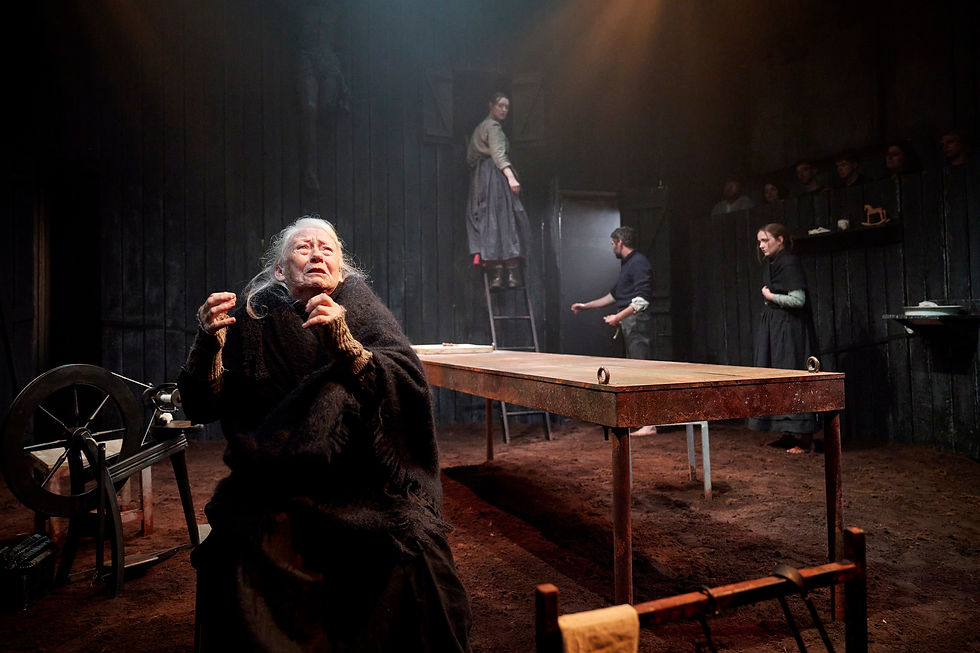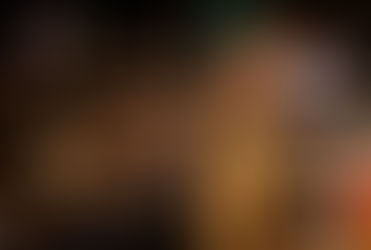Galway International Arts Festival 2025: Riders to the Sea/Macbeth
- Chris O'Rourke
- Jul 16
- 6 min read
Updated: Jul 17

Marie Mullen and Marty Rea in Druid's Macbeth. Image by Ros Kavanagh
****
Some facts land with sobering clarity. Including there are as many years between 1925 and 1975 as there are between 1975 and today. A sobering thought. The year not chosen randomly. 1975 saw a modest theatre company arrive onto the Irish theatre landscape with J.M. Synge’s Playboy of the Western World. Their name, Druid, capturing a sense of mystery, power and tradition. From inauspicious beginnings in the west of Ireland they grew to become one of the defining forces of Irish theatre. The multi-award winning Druid celebrating fifty years at the vanguard of what’s best, bold and brilliant in theatre making, be it classic revivals or new works. Consistency to exacting standards married to core personnel, such the inimitable Garry Hynes and the irreplaceable Marie Mullen, have seen Druid evolve from motley crew to theatrical family, to growing Galway based community. Throughout their five decades Druid have maintained a strong relationship with Galway International Arts Festival, which will celebrate its own 50th anniversary in 2027. Their relationship continuing as Druid kick off their 50th Anniversary Season with a unique double bill: J.M. Synge’s Riders to the Sea, and Shakespeare's Macbeth. A double bill steeped in darkness, death, blood and brooding that’s not for the faint of heart.

Marie Mullen, Rachel O'Byrne, Marty Rea and Pattie Maguire in Druid's Riders to the Sea. Image by Ros Kavanagh
If Shakespeare had his Globe, Francis O’Connor’s superlative design ensures Druid have their Cube. The Mick Lally Theatre seated on three sides of a soil covered, wood-fringed floor becoming a thrust like barn, or semi round. Hidden doors allowing entrances and exits that transform the space from island cottage to Birnam Woods battlefield where shadowy fighters scurry and crawl across the stage. Colin Grenfell’s stunning lights thickening the shadows whilst texturing Gregory Clarke’s explosive thunder with flashes of lightning; Clarke’s sound design often chilling the silence with haunting whispers of wind. Conor Linehan’s point perfect score adding supporting breaths to a vibrant body of text and performances. These the primary colours informing director Garry Hynes’s directorial palette with which she composes powerful, indelible images over and over and over. Director and tech crafting a liminal space between this world, the otherworld and the underworld whose power is felt rather than seen. Fusing the soil, the air and the inhabited darkness with unseen potency, charging the very atoms and the space between the atoms.

Marie Mullen in Druid's Riders to the Sea. Image by Ros Kavanagh
Beginning with Synge’s twenty five minute masterpiece, Riders to the Sea, which takes place in a cottage on an island off the west of Ireland. The Islanders easy hybrid of Christian spirituality and pagan superstition very much in evidence. Daily bread, like the host raised in ritual, sees Rachel O’Byrne’s compelling Cathleen kneading the bread with her breath of life before spinning the threads of fate; Byrne’s bread revisited in Macbeth establishing a visual link between both productions. The sudden arrival of Pattie Maguire’s jittery Nora brings news of Michael, presumed lost at sea. Neither woman anxious to tell his mother Maurya, an indomitable Marie Mullen, given she has already lost all the men in her life to the sea. Bar one, her remaining son Bartley. Notions of manliness seeing Marty Rea’s Bartley seek his mother’s blessing as he sets sail to Galway; the maternal motif echoed fiercely in Hynes’s reimagined Macbeth. Hynes’s impeccable direction allowing Mullen’s silence to speak to the power of Bartley's need, its condemnation and its denial. Crone, witch, prophetess, Maurya’s soul is older than the soil, deeper than the sea, honed into impenetrable stuff that only a mother who's known bitter suffering and survived can fathom. Mullen’s Maurya nothing less than a force of nature. Leading to the curse that follows, the visitor from another world, the stark prophecy of doom and its supernatural forces guiding Synge’s pocket tragedy towards its inevitable conclusion, offering a foreshadowing of the Macbeth still to come. Ensuring that had you to go home before Macbeth, you would still leave infinitely enriched.

Druid's Macbeth. Image by Ros Kavanagh
A defining characteristic of Druid is they’re forever taking risks. Evident in a brave if somewhat troubled Macbeth. Tensions between the natural and the supernatural tempered by the psychological. Notions of sleepwalkers and diseased, deranged and demented minds offsetting the play’s supernatural pull. Reflected in Hynes reframing the central relationship to that of a young man cursed by the thrall of the manipulative maternal. The casting of Marie Mullen as Lady Macbeth proving a brave if imbalanced choice. Mullen’s older woman dynamics with Marty Rea’s extraordinary Macbeth too often resembling the Oedipal Gertrude and Hamlet. Mullen and Rea suggesting a mother and son successfully repositioning some of the play’s trickier issues; Macbeth grovelling like a dog for his mother rather than his wife’s approval being hugely convincing. As is the clarifying and contextualising of Lady Macbeth’s descent into madness which Hynes directs with exciting fervour. Mullen’s matriarch never more visceral than when she rages about ripping babies from her suckling breasts and bashing their skulls in an effort to will her “son” to power, to do her will, to be a man. As with Riders to the Sea, Mullen makes for a compelling matriarch. The chemistry between Rea and Mullen explosively exciting.

Marty Rea and Marie Mullen in Druid's Macbeth. Image by Ros Kavanagh
Except Shakespeare didn't write Lady Macbeth as Macbeth’s mother. Meaning several lines fall ineffectually by the wayside with several scenes feeling uneven for lack of a lover’s touch. Such love looking incestuous, with terms like husband and wife sounding oddly out of place. The oscillation between parent and partner never convincingly resolved. Leaving Mullen’s uneven performance enlivening the role of matriarch, but feeling forced or implausible when playing Macbeth’s wife. The maternal premise having another unfortunate side effect. That of tipping Rea’s superb Macbeth into a blistering Norman Bates. Rea’s Macbeth running the gamut from convincing hero to corrupt villain to curiously overcooked serial killer hiding in a barn with his lifeless, female victims. The final, blood soaked scene suggesting a gory Silence of the Lambs wherein the FBI agent stealthy sets out to exact final justice. A pity, as there is genuine power in Rea’s undeniably brilliant Macbeth, confirming Rea as possibly the greatest stage actor of his generation.

Marty Rea,Marie Mullen and company in Druid's Macbeth. Image by Ros Kavanagh
Throughout, Francis O’Connor and Clíodhna Hallissey’s costumes enrich what are often stunning performances, even if doubling or tripling up on roles exacts a price a times. Notably a brilliant Seán Kearns who goes to the well once too often in quick succession with contrasting roles. As is often the case with Druid, a mixture of living legends (Marie Mullen), contemporary masters (Rea, a brilliant Rory Nolan, along with a terrific Garrett Lombard) rising stars (Rachel O’Byrne, Liam Heslin, and Caitríona Ennis) as well promising newcomers (Emmet Farrell, Cathal Ryan and the exciting Pattie Maguire going from strength to strength) see Druid’s mentoring approach being rewarded as well as rewarding. Evident in Caitríona Ennis, extraordinary as the baseline linchpin grounding all about her with rigorous detail, quiet focus and calm authority. Ennis commanding her scenes with a cold gaze, firm expression or delicate gesture, or else cackling conversations from beneath a consuming cowl as one of three faceless witches. Or else Druid debutante Emmet Farrell, whose youthfulness amidst this stage of stars crowns a lively performance as Malcolm, the boy who should be King admitting he is not fit to play being a man. Mentored by Liam Heslin’s compelling McDuff, contrasting Farrell’s youthful boyishness with something a king should aspire to: a ruler who can fight like a man, feel like a man, and cry like a man. Still, there’s that whole ripped from the mother’s womb idea which complicates notions of McDuff’s noble masculinity. And Cathal Ryan’s subtle performance promising great things to come. Opening several avenues for fruitful discussion as you leave the Mick Lally Theatre breathless and blown away, wondering how quickly the time went by.

Marty Rea in Druid's Macbeth. Image by Ros Kavanagh
For 50 years Druid have been fashioning complex works of this calibre. 50 years. Some companies can’t survive 50 minutes into their funding application. Some days you simply have to step back. Realise how good we have it. Even a cursory glance at Druid’s countless productions confirm we have been truly blessed. So raise your glass in gratitude and tribute to one of the greatest, bravest, most exciting theatre companies anywhere in the world. Happy 50th Druid. And remember, fifty is the new thirty. There’s still considerable mileage to be had from this inexhaustibly rich, endlessly exciting, relatively young-ish theatre company. Check out this fabulous double bill if you don't believe me, and be prepared to be seriously blown away.
Riders to the Sea by J.M. Synge, and Macbeth by William Shakespeare, presented by Druid Theatre as part of their Fiftieth Anniversary Season, runs as part of Galway International Arts Festival 2025 till July 26.
Macbeth will feature as part of Dublin Theatre Festival 2025 from September 25 till October 5.
For more information visit Galway International Arts Festival or Druid Theatre





















